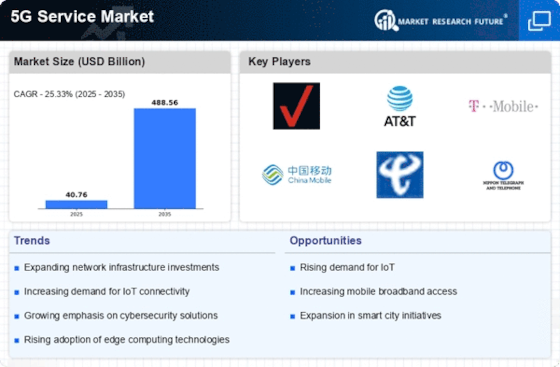Top Industry Leaders in the 5G Service Market

Competitive Landscape of the 5G Service Market: A Deep Dive
The 5G service market, projected to reach a staggering value by 2033, has become a battleground for established telecom giants and disruptive new entrants. Understanding the competitive landscape is crucial for navigating this dynamic market.
Key Players:
- SK Telecom
- Samsung Electronics Co. Ltd.
- LG Electronics Inc.
- Cisco Systems Inc
- Verizon Communications inc.
- Qualcomm inc
- Saudi Telecom Company
- Telefonaktiebolaget L. M. Ericsson
- Intel Corporation
- China Mobile
- BT Group
- Nokia Corporation
- Huawei Investment & Holding Co Ltd
- T-Mobile USA inc
- NEC Corporation
Strategies for Success:
-
Network Investment: Building extensive and reliable 5G infrastructure is paramount. Players are investing in fiber optic backhaul, millimeter wave technology, and network densification to maximize coverage and speed.
-
Spectrum Acquisition: Securing access to valuable 5G spectrum bands is crucial for high-bandwidth applications. Aggressive bidding and strategic partnerships define this aspect of competition.
-
Service Diversification: Moving beyond traditional voice and data services, players are developing innovative offerings like augmented reality, virtual reality, connected devices, and enterprise solutions.
-
Partnerships and Acquisitions: Collaborations with content providers, device manufacturers, and industry players allow companies to expand their reach and access expertise. Acquisitions fuel market consolidation and drive growth in specific segments.
Factors for Market Share Analysis:
-
Network Coverage and Speed: Providing the fastest and most reliable 5G experience is key. Metrics like download speeds, latency, and network availability are crucial for differentiating offerings.
-
Service Portfolio and Pricing: Diverse and competitively priced service packages attract different customer segments. Flexibility and bundling strategies influence market share.
-
Customer Experience and Brand Reputation: Excellent customer service, user-friendly interfaces, and a strong brand image differentiate leading players. Trust and reliability are valued.
-
Investment in Innovation: Continuous investment in new technologies, applications, and research and development fosters market leadership. This includes exploring areas like network slicing, edge computing, and private 5G networks.
New and Emerging Companies:
-
Satellite Service Providers: Companies like SpaceX and OneWeb are launching constellations of low-latency satellites to provide 5G coverage in remote and underserved areas.
-
Vertical Industry Players: Tech giants like Amazon, Google, and Microsoft are entering the fray with industry-specific 5G solutions for healthcare, manufacturing, and smart cities.
-
Cloud-Based Network Providers: Companies like Cloudflare and Altiostar offer software-defined networking solutions, challenging traditional hardware-based infrastructure models.
Current Investment Trends:
-
Focus on Enterprise Segment: Businesses are increasingly adopting 5G for automation, remote monitoring, and enhanced communication. Players are tailoring solutions and partnerships to cater to this demand.
-
Private Network Deployment: Businesses and industries are building their own secure 5G networks for specific use cases, driving investment in network slicing and specialized solutions.
-
Cybersecurity and Data Privacy: Concerns about 5G security and data privacy are prompting investments in encryption technologies, secure network management, and user privacy safeguards.
Latest Company Updates:
-
October 26, 2023: Ericsson predicts 5G subscriptions to reach 1.3 billion by the end of 2023, with a projected 5G population coverage of 45% globally by 2028. -
November 15, 2023: GSMA Intelligence forecasts the global 5G market to reach $1.3 trillion by 2025, driven by increased adoption in emerging economies. -
December 12, 2023: China Mobile, the world's largest mobile operator, announces surpassing 100 million 5G subscribers, highlighting the rapid adoption in the Chinese market.










